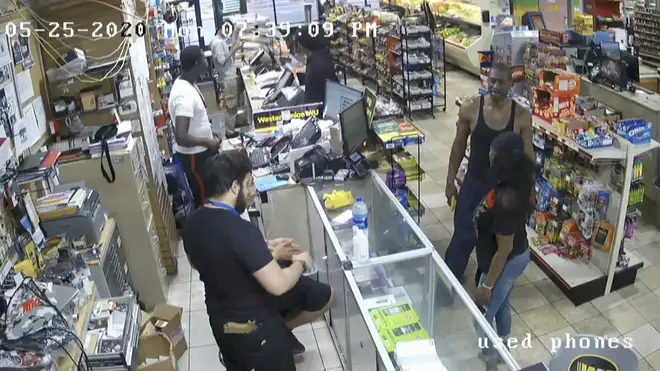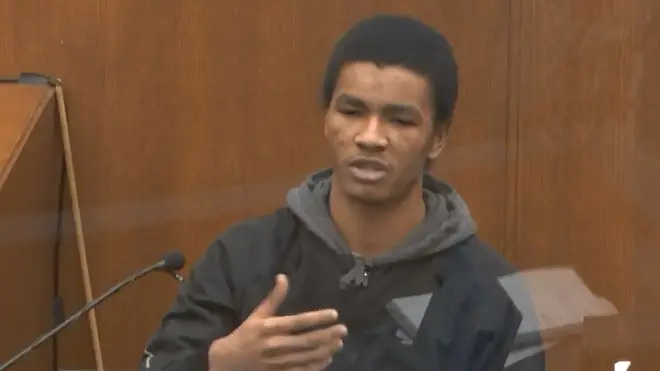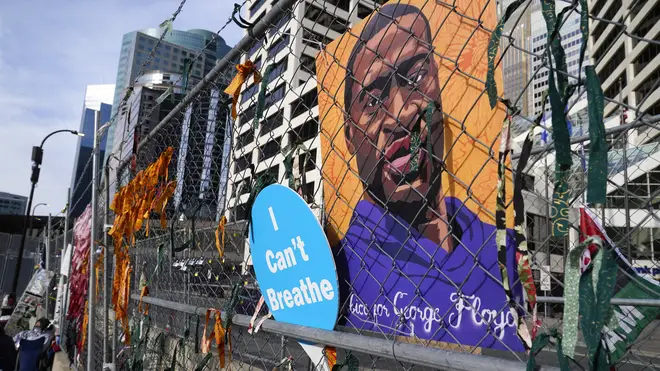
Ian Payne 4am - 7am
31 March 2021, 20:52 | Updated: 31 March 2021, 20:53

The convenience store cashier who sold cigarettes to George Floyd and was handed a counterfeit 20-dollar note in return has given evidence at police officer Derek Chauvin's murder trial.
On the third day of the trial, prosecutors laid out the sequence of events that led to Mr Floyd's arrest and death.
Prosecutors also played store security video showing Mr Floyd in Cup Foods for about 10 minutes last May.
Christopher Martin, 19, said he immediately believed the 20-dollar note Mr Floyd gave him was fake, but took it even though store policy was that the amount would be taken out of his wages.
Mr Martin said he initially planned to just put the note on his "tab" but then second-guessed himself and told a manager, who sent him outside to ask Mr Floyd to return to the store.
Mr Floyd was later arrested outside where Chauvin pinned his knee on his neck for what prosecutors said was nine minutes and 29 seconds, as a handcuffed Mr Floyd lay face-down on the pavement.
The 46-year-old black man was later pronounced dead at a hospital.

Mr Martin said that inside the store, he asked Mr Floyd if he played baseball, and Mr Floyd said he played football, but it took him some time to respond, so "it would appear that he was high".
The defence has argued that Chauvin did what his training told him to do and Mr Floyd's death was not caused by the white officer's knee on his neck, as prosecutors contend, but by a combination of illegal drug use, heart disease, high blood pressure and the adrenaline flowing through his body.
Earlier, a Minneapolis firefighter, who wept on Tuesday as she recalled being prevented from using her training to help Mr Floyd, returned to the witness box briefly on Wednesday.
Genevieve Hansen, one of several bystanders seen and heard shouting at Chauvin as he pinned Mr Floyd down, described her desperation as she recounted on Tuesday how she was unable to go to Mr Floyd's aid or tell police what to do, such as administering chest compressions.
"There was a man being killed," said Ms Hansen, who gave evidence in her dress uniform and detailed her emergency medical technician training. "I would have been able to provide medical attention to the best of my abilities. And this human was denied that right."

Chauvin, 45, is charged with murder and manslaughter. The most serious charge against him carries up to 40 years in prison.
For the unintentional second-degree murder charge, prosecutors have to prove Chauvin's conduct was a "substantial causal factor" in Mr Floyd's death, and that Chauvin was committing felony assault at the time.
For third-degree murder, they must prove that Chauvin's actions caused Mr Floyd's death, and were reckless and without regard for human life. The manslaughter charge requires proof that Chauvin caused Mr Floyd's death through negligence that created an unreasonable risk.
The key questions at the trial will be whether Chauvin caused Mr Floyd's death and whether his actions were reasonable.
On Tuesday, prosecutors showed the nine-minute long videotape, shot by one of the bystanders, that showed Mr Chauvin kneeling on 46-year-old Mr Floyd.
Almost all of the jurors selected during more than two weeks of questioning said they had seen at least parts of the video, and several acknowledged it gave them at least a somewhat negative view of Chauvin. But they said they could set that aside.
Jury selection took more than two weeks, as jurors were questioned individually about their views on police, racial justice issues and pre-trial publicity in the case.
Defence lawyer Eric Nelson, in his opening statements, said that the evidence "is far greater than nine minutes and 29 seconds" of video footage.
This trial is being seen by many as a pivotal moment in US race relations.
Mr Floyd's death, along with the harrowing bystander video of him pleading that he could not breathe as onlookers yelled at Chauvin to get off, triggered sometimes violent protests around the world and a reckoning over racism and police brutality across the US.